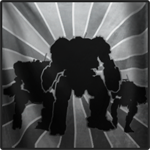One thing I have not seen is consensus.
I think this may be because we have not defined what balance is, exactly.
Let me ask you: If you have an ounce of silver and an ounce of gold, are they balanced? If you have $100 worth of gold and $100 worth of silver, are they balanced?
My point is that balance depends on what you're measuring.
But notice something else: in neither example would I consider gold and silver "equal". And I think this is where we're getting tripped up.
Balance does not need to be equal or same. You can balance a weight of gold against a weight of silver. You can balance a valuation of gold against a valuation of silver.
What it does need is to be clear on what you are measuring.
Let's consider this example a bit further.
Each of these metals has a variety of properties which differentiates them, in no way are they the same. Yet, using a standard measurements we can measure them against each other. Conversely, these same properties make each of them suitable for some uses and unsuitable for others.
I think 'Mechs are very much like this (though perhaps more nuances and less extreme): they don't have to be equal or the same to balance.
Moreover, if they are all equal and the same, why bother piloting one over another?
What we can do is put a set of measuring sticks against them and compare them for their various different properties.
Now comes the tricky part: How do we measure these sticks against each other?
In short, we don't; at least not directly. Neither do we need to.
We do need to make sure that no 'Mech excels in every aspect.
In metals we can create alloys to blend the properties of multiple metals into a new one. That's good because we always want to improve our material to be better for real-world applications.
In 'Mechs, not so good. Any 'Mech that can do everything (or even a couple or a few things) well will make everything else obsolete and therefore wasted effort.
There is a solution to this. It's what I call Internal Balance: the idea that for every up there is a down (you know, like that song in "The Sword in the Stone"!).
Now wait! I don't mean nerf everything! "Average" in everything else may be a good enough counterbalance to a single aspect of excellence. More than one aspect of excellence? I say nerf away!
But some other less obvious aspects of a 'Mech may also be considered. The volume and surface area of a 'Mech may make it a more vulnerable target, for instance. That is a distinct downside; perhaps that 'Mech needs an area of excellence to balance it.
When 'Mechs excel at different things, they will suit different players/playstyles and may fill those roles we've heard so much about. More importantly, it will prevent a single "Meta" from emerging, because no 'Mech can dominate all aspects and other 'Mechs will always be better in some way.
Ok, so the game already has this idea (at least in theory) in its basic system and layout: lights are fast, assaults are tough. It just needs more definition about what we're balancing.
The core of this wall of text, is that we need baselines against which to gauge a 'Mech and arbitrarily measuring them against each other, does not and cannot work.
The same can be said of weapons, InfoTech and engines.
So the question I pose to you is: What are we measuring?
Edited by Brandarr Gunnarson, 23 September 2015 - 10:15 PM.

















